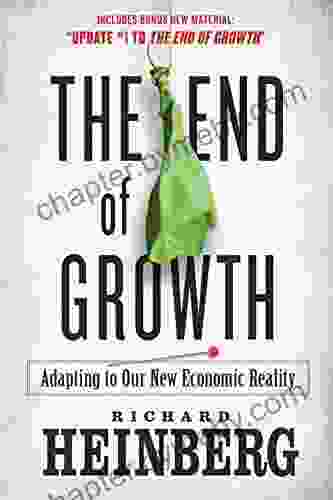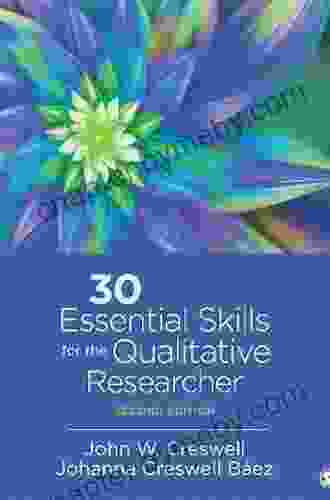30 Essential Skills For The Qualitative Researcher

Qualitative research is an invaluable tool for gaining deep insights into human experiences, behaviors, and beliefs. However, conducting qualitative research requires a unique set of skills that go beyond traditional quantitative methods. This comprehensive guide presents 30 essential skills that every qualitative researcher must master to achieve excellence in their field.
1. Active Listening and Observation
Effective qualitative research begins with active listening and keen observation. The ability to pay undivided attention to participants, observe their body language, and pick up on subtle cues is crucial for gathering rich and meaningful data.
4.9 out of 5
| Language | : | English |
| File size | : | 37028 KB |
| Text-to-Speech | : | Enabled |
| Screen Reader | : | Supported |
| Enhanced typesetting | : | Enabled |
| Word Wise | : | Enabled |
| Print length | : | 336 pages |
2. Interviewing Techniques
Interviews are a cornerstone of qualitative research. Mastering interviewing techniques, such as open-ended questioning, active listening, and rapport-building, enables researchers to elicit in-depth responses and build trust with participants.
3. Focus Group Facilitation
Focus groups facilitate group discussions to generate collective insights. Skillful facilitation involves managing group dynamics, encouraging participation, and synthesizing key themes from the group interactions.
4. Participant Observation
Participant observation allows researchers to immerse themselves in the natural setting of their study, observing participants' behaviors and interactions firsthand. Ethical considerations and careful documentation are essential for this method.
5. Field Note Taking
Thorough and accurate field notes are vital for capturing observations, insights, and reflections during research. Developing a system for systematic note-taking ensures the preservation of valuable data.
6. Data Transcription
Audio or video recordings from interviews and focus groups require careful transcription to transform them into usable text data. Attention to detail and accuracy is paramount during transcription.
7. Coding and Thematic Analysis
Coding and thematic analysis are techniques for identifying patterns, themes, and concepts in qualitative data. Researchers must develop analytical skills to interpret and synthesize the data effectively.
8. Computer-Assisted Qualitative Data Analysis Software (CAQDAS)
CAQDAS tools can enhance qualitative data analysis by automating repetitive tasks, organizing data, and facilitating the exploration of complex relationships. Proficiency in using these tools streamlines the research process.
9. Ethical Considerations in Qualitative Research
Ethical considerations are paramount in qualitative research. Researchers must ensure informed consent, protect participant confidentiality, and adhere to established ethical guidelines.
10. Reflexivity and Positionality
Reflexivity involves critically reflecting on the researcher's own biases, experiences, and positionality. It fosters self-awareness and transparency in the research process.
11. Building Rapport with Participants
Establishing rapport with participants is essential for gaining their trust and encouraging open communication. Researchers should demonstrate empathy, respect, and genuine interest in the participants' perspectives.
12. Cultural Sensitivity
Qualitative research often involves working with participants from diverse cultural backgrounds. Cultural sensitivity ensures that researchers are aware of and respectful of cultural differences that may impact their interactions and interpretations.
13. Small Sample Size Considerations
Qualitative research typically involves smaller sample sizes compared to quantitative methods. Researchers must be aware of the limitations and advantages of small sample sizes and adjust their analysis strategies accordingly.
14. Qualitative Research Ethics
Understanding and adhering to qualitative research ethics guidelines ensures the integrity and credibility of the research findings. These guidelines cover issues such as informed consent, confidentiality, and participant autonomy.
15. Triangulation
Triangulation involves using multiple data sources or methods to enhance the validity and reliability of the research findings. Combining different perspectives can provide a more comprehensive understanding of the research topic.
16. Interpretation and Generalization
Qualitative research findings are often rich in context and nuance. Researchers must be able to interpret and generalize their findings while acknowledging the limitations and specific nature of the study.
17. Writing for Qualitative Research
Qualitative research reports require a distinct writing style that conveys the richness of the data and the researcher's interpretations. Clear and engaging writing is essential for effectively communicating the research findings.
18. Research Design and Sampling
Qualitative research designs and sampling strategies vary depending on the research question. Understanding different approaches and their implications is crucial for selecting the most appropriate methods.
19. Grounded Theory
Grounded theory is an inductive approach to qualitative research where theories are developed directly from the data. Researchers engage in iterative data collection and analysis to develop a grounded theory that explains the phenomenon being studied.
20. Ethnography
Ethnographic research involves immersive fieldwork and detailed observation of a specific cultural group or social setting. This method provides a deep understanding of the group's beliefs, values, and practices.
21. Phenomenology
Phenomenological research focuses on understanding the lived experiences and perspectives of individuals. Researchers aim to gain insights into the subjective meanings and interpretations that participants attach to their experiences.
22. Discourse Analysis
Discourse analysis examines how language is used in different contexts. Researchers analyze written or spoken texts to understand how power, ideology, and social structures are constructed and negotiated through language.
23. Visual Research Methods
Visual research methods involve using visual data, such as photographs, videos, or artifacts, to gain insights into human experiences. Researchers analyze visual data to identify patterns, symbols, and meanings that may not be apparent from verbal data alone.
24. Qualitative Data Management
Effective qualitative data management ensures that data is organized, stored, and retrieved efficiently. Researchers must develop strategies for securely storing and backing up data, as well as managing large datasets.
25. Data Saturation
Data saturation is the point at which no new significant information or themes are emerging from further data collection. Researchers need to be able to identify when data saturation has been reached to avoid overcollecting data.
26. Statistical Software Skills
Although qualitative research primarily relies on non-statistical data, basic statistical skills can be helpful for descriptive analysis, data visualization, and identifying trends in qualitative data.
27. Rigor and Credibility in Qualitative Research
Establishing rigor and credibility in qualitative research involves employing strategies such as triangulation, reflexivity, and peer review to ensure the trustworthiness and validity of the findings.
28. Presenting Qualitative Research Findings
Communicating qualitative research findings effectively requires clear and engaging presentations. Researchers must adapt their presentations to different audiences and use strategies to convey the richness and complexity of their data.
29. Research Funding and Proposal Writing
Securing research funding is crucial for qualitative research projects. Researchers must be able to effectively write grant proposals that clearly articulate the research question, methodology, and significance of their proposed study.
30. Collaborating with Interdisciplinary Teams
Qualitative research often involves collaboration with researchers from other disciplines. Researchers should develop skills in interdisciplinary communication and teamwork to facilitate successful collaborations.
Mastering the 30 essential skills outlined in this guide will empower you to conduct qualitative research with confidence and proficiency. These skills provide a solid foundation for gathering meaningful data, analyzing it effectively, and interpreting the findings to gain deep insights into human experiences and behaviors. Embrace these skills, hone your craft, and elevate your qualitative research to the next level.
4.9 out of 5
| Language | : | English |
| File size | : | 37028 KB |
| Text-to-Speech | : | Enabled |
| Screen Reader | : | Supported |
| Enhanced typesetting | : | Enabled |
| Word Wise | : | Enabled |
| Print length | : | 336 pages |
Do you want to contribute by writing guest posts on this blog?
Please contact us and send us a resume of previous articles that you have written.
 Book
Book Novel
Novel Page
Page Chapter
Chapter Text
Text Story
Story Genre
Genre Reader
Reader Library
Library Paperback
Paperback E-book
E-book Magazine
Magazine Newspaper
Newspaper Paragraph
Paragraph Sentence
Sentence Bookmark
Bookmark Shelf
Shelf Glossary
Glossary Bibliography
Bibliography Foreword
Foreword Preface
Preface Synopsis
Synopsis Annotation
Annotation Footnote
Footnote Manuscript
Manuscript Scroll
Scroll Codex
Codex Tome
Tome Bestseller
Bestseller Classics
Classics Library card
Library card Narrative
Narrative Biography
Biography Autobiography
Autobiography Memoir
Memoir Reference
Reference Encyclopedia
Encyclopedia Michael J Howell
Michael J Howell Silvia Rief
Silvia Rief Scott Ryan
Scott Ryan Moss Hart
Moss Hart Marko Cabric
Marko Cabric Mike Hoare
Mike Hoare Sakthivel Pannerselvam
Sakthivel Pannerselvam Micah Toll
Micah Toll Matt Burns
Matt Burns Susan Marks
Susan Marks Massad Ayoob
Massad Ayoob Laini Taylor
Laini Taylor Richard Davies
Richard Davies Mike Dauplaise
Mike Dauplaise Michael R Heinlein
Michael R Heinlein Michael Datcher
Michael Datcher Michael Burnett
Michael Burnett Mary Matthews
Mary Matthews Reynaldo S Galang
Reynaldo S Galang Nathaniel Popper
Nathaniel Popper
Light bulbAdvertise smarter! Our strategic ad space ensures maximum exposure. Reserve your spot today!

 Nathaniel HawthorneAdapting to Our New Economic Reality: A Guide to Thriving in the 21st Century
Nathaniel HawthorneAdapting to Our New Economic Reality: A Guide to Thriving in the 21st Century
 Colin RichardsonUnleash the Magic: Journey into the Enchanting World of Volume Two of The...
Colin RichardsonUnleash the Magic: Journey into the Enchanting World of Volume Two of The... Jared NelsonFollow ·7.8k
Jared NelsonFollow ·7.8k Junichiro TanizakiFollow ·11.5k
Junichiro TanizakiFollow ·11.5k Ethan MitchellFollow ·8.6k
Ethan MitchellFollow ·8.6k Will WardFollow ·17.3k
Will WardFollow ·17.3k Reed MitchellFollow ·2.4k
Reed MitchellFollow ·2.4k Juan RulfoFollow ·11.6k
Juan RulfoFollow ·11.6k Edison MitchellFollow ·18.6k
Edison MitchellFollow ·18.6k Thomas MannFollow ·17k
Thomas MannFollow ·17k

 Henry James
Henry JamesCold War Fighter Pilot Story: A Captivating Tale of...
Enter the Cockpit of...

 Rudyard Kipling
Rudyard KiplingYour Body Your Baby Your Choices: The Essential Guide to...
Pregnancy and...

 Fabian Mitchell
Fabian MitchellMichelle Obama: An Intimate Portrait - A Must-Read for...
Michelle Obama is a prominent figure in...

 Juan Butler
Juan ButlerUncover the Secrets of the Dead Land Warshawski Novels
Prepare to delve...
4.9 out of 5
| Language | : | English |
| File size | : | 37028 KB |
| Text-to-Speech | : | Enabled |
| Screen Reader | : | Supported |
| Enhanced typesetting | : | Enabled |
| Word Wise | : | Enabled |
| Print length | : | 336 pages |












